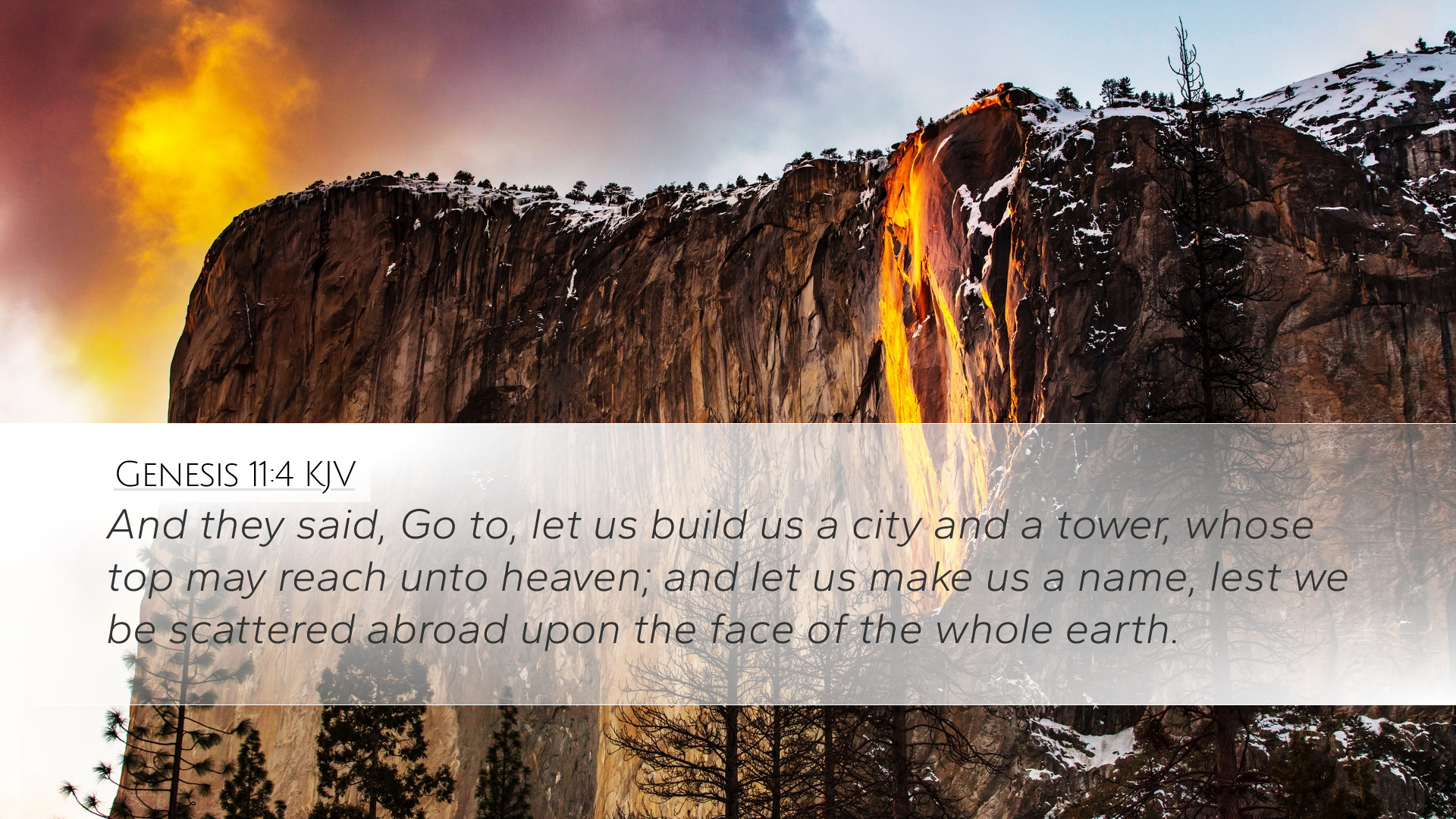Commentary on Genesis 11:4
Verse: Genesis 11:4 states, "And they said, Go to, let us build us a city and a tower, whose top may reach unto heaven; and let us make us a name, lest we be scattered abroad upon the face of the whole earth." This verse details the ambition and unity of humanity shortly after the flood, as they sought to establish a city and a tower.
Context and Meaning
The context of this passage is critical. Following the flood, humanity begins anew, and they share a singular language and purpose. This was a time when people sought to make their known space grand, perhaps as a challenge to God’s intention for them to spread and fill the earth.
1. Human Ambition
Matthew Henry highlights the ambition of the people, noting that their project symbolizes humanity's desire to reach beyond granted limits. Their intention to build a tower that reaches unto heaven indicates the pride of the human heart—a tendency to rival God. They sought to establish a 'name' for themselves, which reveals the core sin of self-exaltation.
2. Unity and Language
Albert Barnes elaborates on the importance of language in this narrative. The people of Babel shared one language, which facilitated their collaboration in this monumental task. This unity can be seen as a double-edged sword; while it allowed them to work together effectively, it also led to collective rebellion against God. The verse illustrates the consequences of shared human ambition without divine direction.
3. Distrust and Fear of Divine Decree
Adam Clarke points out the underlying fear of being scattered by God. This reflects a deeper theological theme of mistrusting God's plans and seeking control over their fate. In their desire to avoid dispersion, they openly defy God’s command to fill the earth—a command given to Noah in Genesis 9:1.
Theological Themes
- Humanity's Rebellion: The desire to ascend to heaven aligns with other biblical themes of rebellion against God. The tower represents an attempt to usurp God's authority and elevate human status.
- God’s Sovereignty: This narrative captures the essence of God’s sovereignty in opposition to human plans. The ensuing confusion of languages serves as a divine intervention to thwart their ambitions.
- Community vs. Individual Purpose: The juxtaposition of communal ambition against God's intention highlights the need for individual believers to align their plans with divine purpose, rather than collective self-serving goals.
Lessons for Pastors and Theologians
In reflecting on Genesis 11:4, pastors and theologians are reminded of the importance of humility before God. This narrative serves as a poignant warning against human pride and the misleading influence of collective ambition. Here are key lessons:
- The Danger of Unity without God: While unity in the church is vital, it must always be rooted in Christ. Unity that seeks to elevate human goals over divine mandates leads to spiritual confusion.
- The Need for Divine Guidance: Leaders must consistently seek God’s will rather than pursuing ambitious endeavors that stem from fear or distrust in God's plan.
- God’s Purpose is Greater: Even when humans strive for greatness, God’s plans cannot be thwarted. His sovereignty ensures that ultimately, His word will prevail over human rebellion.
Practical Application
For those in ministry or study, this passage encourages introspection regarding ambition:
- Evaluate Motivations: Are we pursuing goals that glorify God, or are we building our own towers of self-satisfaction?
- Seek God's Direction in Unity: Collate strengths in community but remain attuned to God’s calling to serve the greater purpose of spreading the gospel.
- Be Aware of Pride: Regularly assess personal and communal attitudes towards achievement in the faith community and remain vigilant against pride.
Conclusion
Genesis 11:4 encapsulates the complex interplay between human ambition, unity, and divine authority. The insights drawn from historic commentaries remind readers that while humanity may strive to build their own kingdoms, it is ultimately God's will that directs the course of creation. The Babel narrative warns that pursuits not rooted in God lead to confusion and dispersion, while affirming that genuine purpose comes from obedience and dependence on God.


